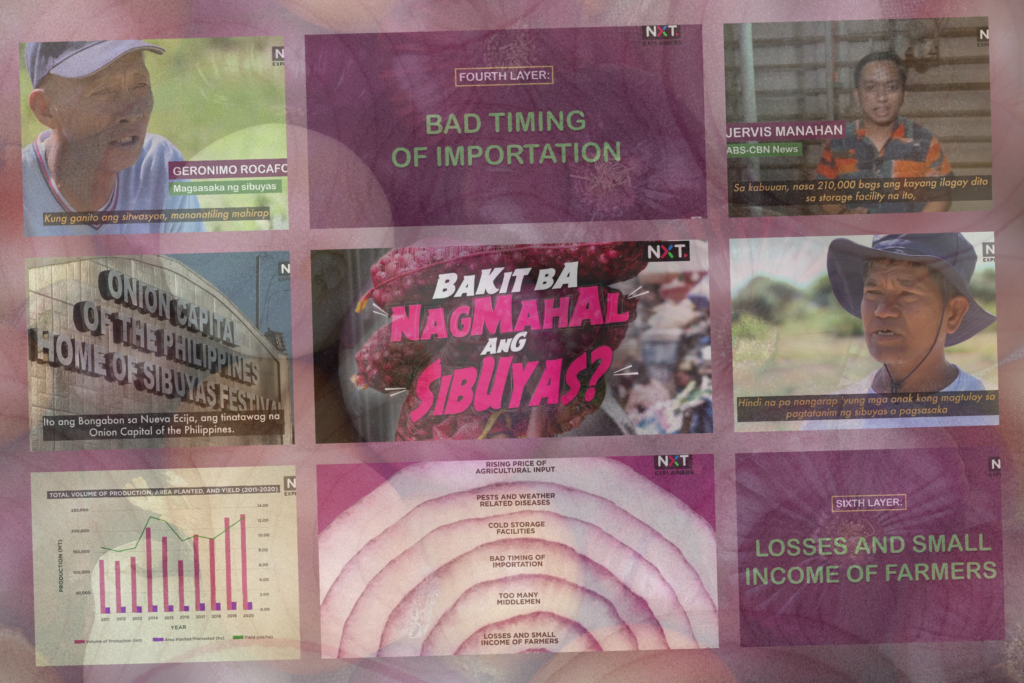ABS-CBN News Bares Layers of Onion Crisis

CHEERS TO ABS-CBN News for looking into the multiple issues behind the drastic increase in onion prices in the Philippine market. NXT, ABS-CBN News’ digital arm, produced an explainer last February 13 that described the challenges faced by onion farmers.
While other reports relied on government pronouncements and legislative probes, NXT interviewed onion farmers. ABS-CBN News’ Jervis Manahan interviewed the farmers of Bongabon, Nueva Ecija, the Onion Capital of the Philippines, who enumerated the difficulties they are confronted with in the industry. The report is the digital counterpart of the special report of Manahan in TV Patrol last February 7.
Both reports covered the Bongabon farmers and their current condition, but the NXT report emphasized the layers of problems at the production level. Manahan presented these problems using an onion-like diagram, each layer showing problems at every stage of production and distribution.
Growing costs of Agricultural Needs
Manahan pointed to the first problem in onion farming: High capital. PHP 300,000 is the lowest amount a farmer needs to farm and grow onions in a one-hectare field, but it is already too much for small farmers. Seedling facilities are not available in the country, which warrants the importation of seedlings. The continuously increasing fertilizer costs also challenge not only onion growers, but all farmers in general.
Victor Layug, an onion farmer in Bongabon, said this hefty capital need pushes farmers into bankruptcy. Layug said that farmers tend to sell their own carabaos when they experience losses, and sometimes mortgage their own land just to make ends meet.
The high capital also discourages many farmers to continue planting onions. Ricardo Padilla, mayor of Bongabon, said from 2,800 hectares of farmland dedicated to onions, the number plummeted to 1,800 as most onion farmers chose to plant other crops.
Pests and Weather-Related Issues
Pests are not new in farming, but it is more concerning given the crisis the farmers are currently facing. “Harabas” or army worms are pests that can decimate crops overnight. Manahan cited Daniel Alfaro, a Bongabon onion farmer, who said that army worms can destroy 30-40 bags out of an expected 200-bag yield.
Cold Storage Facilities
Leasing a cold storage facility is expensive as well. PHP 270 a bag is a lot for farmers, especially the small ones, to deduct from their expenses. The problem gets worse, as there is only one working cold storage facility in Bongabon, and it is privately-owned. Two more cold storage facilities are currently being constructed — one by the local government unit, and one funded by an unnamed non-government organization.
There are 70 cold storage facilities nationwide, ten of which are in Nueva Ecija. Manahan cited Anthony Dizon, president of the Cold Chain Association of the Philippines, as confirming the shortage of facilities to prolong onion’s shelf life. Dizon added that onions require a dedicated facility, and that no other crop or product can be stored in this facility alongside the onions.
Wrong Timing of Importation
The report cited Jose Diego Roxas, spokesperson for the Bureau of Plant Industry (BPI). Roxas said that the government decided not to import onions last year.
Without verification when the onion harvesting season is, the government decided to import onions in January of this year, which, according to farmers, is the wrong time as it coincided with the harvest season.
Too Many Middlemen
In Bongabon, onions are sold for PHP 100 per kilo, far from the almost PHP 600 price tag in the city. Manahan mentioned the reason for this — middlemen. The report lamented that as the onions go through many stages before being sold in the market, they add more costs for handling, transportation, and fuel.
Manahan briefly explained the process. Right after harvest, the crops are brought to buying stations. From there, they are sold to various businessmen, who in turn sell the onions to market vendors in Metro Manila.
In Manahan’s own words, “Bawat stopover may patong na presyo.” (Each stopover requires an additional price.)
These deep-seated issues within the onion industry have resulted in low incomes for farmers, who frequently find themselves operating at a loss. BPI mentioned that they are doing everything they can to help the farmers — giving away high-yielding varieties of seeds, subsidies, and construction of more cold storage facilities – to reduce their losses.
Farmers are the backbone of any country’s food supply, providing essential sustenance to people across the nation. However, it is the government’s responsibility to ensure that farmers are able to produce their crops at a stable rate by providing the necessary support and resources. Manahan noted this in concluding his report.
The media have a vital role to play by going beyond surface-level reporting to present a comprehensive picture of the challenges farmers face. By shedding light on the real conditions of farmers, the media can help call the attention of the relevant government departments and spur into supporting these critical members of our society.
Leave a Reply